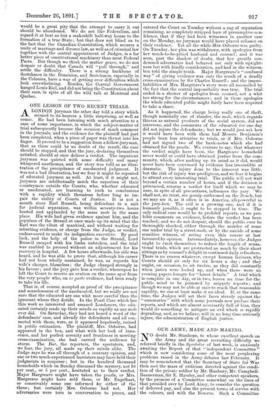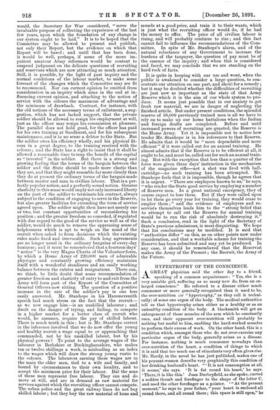OUR ARMY, MADE AND MAKING.
N0 doubt Mr. Stanhope, to whose excellent speech on the Army and the great recruiting difficulty we referred briefly in the Spectator of last week, is anxiously awaiting the Report of that "independent Committee" which is now considering some of the most perplexing problems raised in the Army debates last February. It may be remembered that the Secretary of State for War then met the mass of criticism directed against the condi- tion of the private soldier by Mr. Hanbury, Mr. Campbell- Bannerman, Sir E. Hamley, and other competent speakers, by the promise of a Committee somewhat on the lines of that presided over by Lord Airey, to consider the question of deferred pay, and also the present terms of service with the colours, and with the Reserve. Such a Committee would, the Secretary for War considered, "serve the invaluable purpose of collecting the experience of the last few years, upon which the foundation of any change in our system ought to be laid." It is to be hoped that the Committee may be allowed to present and publish, not only their Report, but the evidence on which that Report will be based ; and until that has been done, it would be well, perhaps, if some of the more im- patient amateur Army reformers would be content to suspend judgment on the delicate questions of recruiting and reservists which are now attracting so much attention. Still, it is possible, by the light of past inquiry and the normal conditions of the labour market, to make some forecast of the changes which the Committee may see fit to recommend. Nor can current opinion be omitted from consideration in an inquiry which aims in the end at in- fluencing current opinion, and attaching to the notion of service with the colours the maximum of advantage and the minimum of drawback. Contrast, for instance, with the old notions of the necessary terms of enlistment, a sug- gestion, which has not lacked support, that the private soldier should be allowed to resign his employment at will, just as the officer may resign his commission at pleasure. The parallel does not hold good, for the officer has paid for his own training at Sandhurst, and for his subsequent maintenance, and is in no sense a debtor to the State. But the soldier owes his efficiency wholly, and his physical fit- ness in a great degree, to the training received with the colours ; and the State has a right to insist that it shall be allowed a reasonable time to reap the benefit of the capital so " invested " in the soldier. But there is a strong and growing feeling that the terms of the bargain between the soldier and the State should be made more elastic than they are, and that they might resemble far more closely than they do at present the ordinary terms of the bargain made between master and man in civilian labour. That is a per- fectly popular notion, and a perfectly sound notion. Greater elasticity in this sense would imply not only increased liberty on the part of the soldier to terminate his contract, always subject to the condition of engaging to serve in the Reserve, but also greater facilities for extending the term of service agreed upon. The soldier might then have not merely one or two, but constant opportunities of reconsidering his position ; and the greater freedom so conceded, if regulated with due regard to the good of the service as well as of the soldier, would do much to remove the oppressing sense of helplessness which is apt to weigh on the mind of the recruit when asked to form decisions which the existing rules make fixed and irrevocable. Such long agreements are no longer usual in the ordinary bargains of every-day business ; and it must be remembered that a fourteen days' " notice " is the very Magna Charta of the Volunteer force, by which a Home Army of 220,000 men of admirable physique and constantly growing efficiency maintains itself with a wonderful steadiness and an easily working balance between the entries and resignations. There can, we think, be little doubt that some recommendation of greater freedom and elasticity of entry to and exit from the Army will form part of the Report of the Committee of General Officers now sitting. The question of a positive increase in the rate of the soldier's pay is one less easily answered. Mr. Stanhope in his Hammersmith speech laid much stress on the fact that the recruit— as we now engage him—is an unskilled labourer ; and dwelt on the danger of trying, and failing, to compete in a higher market for a better class of recruit who would, he assumes, require the pay of skilled labour. There is much truth in this ; but is Mr. Stanhope correct in the inference involved that we do now offer the young and healthy recruit a wage equal to or approaching that commanded, not by his unskilled labour, but by his physical powers To point to the average wages of the labourer in Berkshire or Buckinghamshire, who makes ten or twelve shillings a week, is misleading as an index to the wages which will draw the strong young rustic to the colours. The labourers earning these wages are in the main the older men, tied to a wife and family, and bound by circumstances to their own locality, and to accept the minimum price for their labour. But the sons of these men represent free labour. They can and do move at will, and are in demand as raw material for services against which the recruiting officer cannot compete. The urban police and the great railway lines do not buy skilled labour ; but they buy the raw material of bone and muscle at a good price, and train it to their wants, which is just what the recruiting officer would do, if he had the money to offer. The price of all civilian labour is rising, and will probably continue to rise ; and this fact cannot fail to influence the recommendations of the Com- mittee. In spite of Mr. Stanhope's alarm, and of the natural reluctance of any Government to increase the burdens of the taxpayer, the question of pay must be of the essence of the inquiry ; and when this is considered and faced, we may conclude that we are standing on the hard rock of facts.
It is quite in keeping with our use and wont, when the public is awakened to consider a large question, to con- centrate our attention on one part, and shout for a remedy ; but it may be doubted whether the difficulties of recruiting are just now so important as the state of that Army Reserve which it is the aim of our whole system to pro- duce. It seems just possible that in our anxiety to get fresh raw material, we are in danger of neglecting the finished article. But under present conditions, the splendid reserve of 66,000 previously trained men is all we have to rely on to make up our home battalions when the Indian and foreign drafts are completed. Before and until increased powers of recruiting are granted, the Reserve is the Home Army. Yet it is impossible not to notice how tender Mr. Stanhope is in his references to that Reserve. He admits that it would be "more dependable and more efficient" if it were called out for an annual training. He almost admits that if the Reserve is to be efficient at all, it ought to be, and must be, called out for such an annual train- ing. But with the exception that less than a quarter of the force were given three days' instruction in the mechanism of the magazine rifle—not a shot was fired with ball- cartridge—no such training has been attempted. Mr. Stanhope feels that it is impossible, though he agrees that it is urgent. "There are employers known to us," he says, "who render the State good service by employing a number of Reserve men. In a great national emergency, they of course expect to lose them. But if they were called upon to let them go every year for training, they would cease to employ them ; " and the evidence of employers and re- servists themselves leads him to the "strong belief that to attempt to call out the Reserve for annual training would be to run the risk of absolutely destroying it." Such a conclusion, read in the light of the Secretary of State's previous admissions, is most disquieting. We hope that his conclusions may be modified. It is said that "authorities differ" on this, as on other points now under consideration, and that a workable scheme for training the Reserve has been submitted and may yet be produced. In any case, it should be remembered that the Reservist makes the Army of the Present ; the Recruit, the Army of the Future.



































 Previous page
Previous page